HOME | ABOUT US | MEDIA KIT | CONTACT US | INQUIRE
HOME | ABOUT US | MEDIA KIT | CONTACT US | INQUIRE
PUBLISHED NOVEMBER 2024
Over the past half-century these captains of industry created, led or shaped companies that changed the face of a state, a nation, and a world.
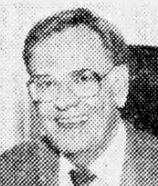 Lionel Alford, The Boeing Co., Wichita
Lionel Alford, The Boeing Co., Wichita
A suicide mission. That’s what Lionel Alford’s peers suggested this former test pilot was taking on when Boeing’s Seattle leadership sent him to Wichita in 1977 to lead a division on the brink of insolvency. Alford made it a profit center—and still had to fight the C-suite in Seattle when the company considered shuttering the Kansas plant in the 1980s. Alford made his case; the plant remained open, 20,000 employees retained their jobs, and thousands more working for more than 1,000 vendors did, too. Until his death in 2000, he was known in Wichita as The Man Who Saved Boeing, but truth be told, he was much more than that. Alford retired in 1989 and remained right there, heading up a newly created economic development entity called the Wichita/Sedgwick County Partnership for Growth. A Louisiana native who flew 100 combat missions in World War II and Korea, Alford had a zeal for aviation that framed his commitment to the Air Capital of the World.
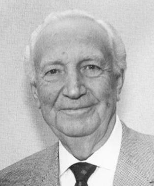 Frank Barton, Rent-A-Center, Wichita
Frank Barton, Rent-A-Center, Wichita
Frank Barton drew on his experience as a retail store manager to start his own appliance distribution company, serving hundreds of dealers across Kansas. In 1973, he teamed with a young entrepreneur with a vision for a different kind of appliance outlet they would call Rent-A-Center, and leasing by the month, not direct selling. It took six years, but by 1979, Barton was able to leave his business to concentrate on the new venture. In 1987, he and Tom Devlin sold it to a British company for $594 million—equal to about $1.7 billion today. Barton was thus well positioned that year to give Wichita State $12 million—the largest gift to any private university in the state up to that point—to fund the school of business named in his honor. He’s an Oklahoma native who never made it to college, but adopted WSU. Before he died in 2000, he served on the board of governors for WSU’s endowment association, co-chaired $100 million campaign, and served on its board.
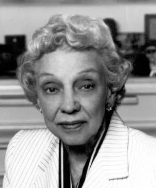 Olive Ann Beech, Beechcraft, Wichita
Olive Ann Beech, Beechcraft, Wichita
Amelia Earhart may come to mind as a female pioneer in the field, but the real First Lady of Aviation in Kansas didn’t hail from Atchison—she made her mark in Wichita. That would be Olive Ann Beech, born just a year after the Wright brothers first took flight, who partnered with her husband Walter nearly a century ago to start Beech Aircraft. While he handled plane design and testing, she worked the office and financial end, then assumed leadership of the company as president and chairman after he died in 1950. Even after her retirement in 1982, she served as chairman emeritus until her own death in 1993. The company’s contribution to a nascent but thriving aviation design/construction sector included a cabin biplane, preference for powerful engines, and innovations like retractable landing gear. Their twin-engine monoplane, Model 18, was in production for 30 years, with 7,100 built, and after World War II, they introduced the first Bonanza, subsequent models remain in production today.
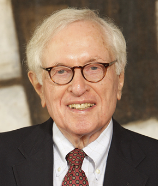 Robert Beren, Berexco, Wichita
Robert Beren, Berexco, Wichita
Robert Beren served in Gen. George Patton’s 3rd Army during World War II, so he had plenty of exposure to the concept of risk vs. reward. He took the former and found the latter after leaving his family’s oil and gas business in Ohio after the war and led an expansion into Kansas. That was the kernel for Berexco, which he would turn into the largest independent oil and gas company in Kansas and Nebraska. It’s still near the top; last year, Berexco pulled 1.44 million barrels of oil from the ground. Berexco had a key role in the discovery of a huge field of oil and gas in southwest Kansas in the 1990s—we know it today as the Hugoton Gas Field, one of the biggest energy sources in the state. Highly respected within his industry, he was co-chairman of the Council of Active Independent Oil and Gas Producers, sat on the Kansas Independent Oil & Gas Association board of directors, and is in the Kansas Oil & Gas Hall of Fame. He was 97 when he died in August 2023.
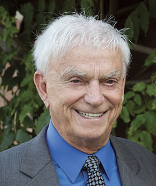 Gene Bicknell, NPC International, Pittsburg
Gene Bicknell, NPC International, Pittsburg
Gene Bicknell may be best known as founder of NPC International, at one time the world’s largest Pizza Hut franchisee. But that barely scratches the surface with this entrepreneurial titan from Pittsburg, by way of hometown Baxter Springs. He also launched Pitt Plastics, which makes polyethylene can liners, packaging and storage bags; National Mills, which produces t-shirts and screen-printing services; Zouire, a national promotional apparel and supplies company; and M.S. Productions, an oil development and reserve operation. He’s legendary at Pittsburg State University, where he earned his business and MBA degrees, for driving developmental and philanthropic initiatives. He’s been a go-to resource for Kansas governors with task-force seats on economic and educational efforts. (He ran for governor in 1994.) His board service—corporate and non-profit—has been prolific. He’s even been an author—“Never Fry Bacon in the Nude, and other life lessons.”
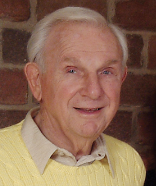 Henry Bloch, H&R Block, Mission Hills
Henry Bloch, H&R Block, Mission Hills
What set Henry Bloch apart as an entrepreneur and a business executive? It wasn’t his success, though he had it on a world-impacting scale. Despite his wealth (the charitable family foundation he left behind had $422 million in assets when he died in 2019) and despite his success (H&R Block today is a global financial-services company with revenues of more than $3 billion), what really set Henry Bloch apart was his openness, his willingness to share his hard-earned wisdom of going from start-up to a global company, in the hopes that he could contribute to producing more Henry Blochs. The co-founder of H&R Block made his fortune with the tax preparation business, then spent decades giving much of it away in large quantities. His $32 million gift to UMKC underwrote a new school of business building; the foundation has donated more than $81 million to various causes and non-profits, including $21 million to UMKC in 2019.
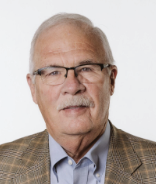 Lee Borck, Innovative Livestock Services, Great Bend
Lee Borck, Innovative Livestock Services, Great Bend
As much as anyone in Kansas, Lee Borck has been a colossus in the development of the beef production space, from the feed yard to the meat case at your local grocer. Raised on a farm in Marshall County, he earned a degree in agricultural economics from K-State, took his first job with the Larned Production Credit Association, then signed on at a feed yard in 1979 and started a trek that would lead to INS, which operates nine feedlots in Kansas and Nebraska. The goal at each: producing higher-quality cattle, earning premiums on sales of each animal to packers. Though he retired from INS this past spring, he’s the founding shareholder and chairman of American State Bank in Great Bend, and he’s been president of the Kansas Livestock Association, a board member for both the Cattlemen’s Beef Board and the NCBA Federation Board. A huge K-State fan, he’s held seats on the KSU Foundation board and chaired both the executive committee and the investment committee for the university.
Harry Bresky, Seaboard Corp., Merriam
A decade before “vertical integration” became a catchphrase in business, Harry Bresky was applying the principles to poultry and pork production for Seaboard Corp., the enterprise his father had started in 1918 by acquiring a single flour-milling operation in Atchison. Otto Bresky had plenty of runway ahead of him—he wasn’t yet 30 when he made that acquisition—and he oversaw the growth and expansion until turning the leadership over to Harry in 1973. Over the three decades that followed, Harry made strategic moves that set the stage for growth that has made Seaboard the largest public company in the Kansas City region today, with 2023 revenues of more than $10 billion. Among those moves: Selling the company’s American flour mills to Cargill, forming Seaboard Marine to control shipment of its agricultural products around the world, acquiring a poultry division, building a power station in Central America, and making major moves into pork processing, sugar cane, citrus—even a winery in Bulgaria. He retired as CEO in 2004, with his son, Steven, succeeding him, and he died in 2007.
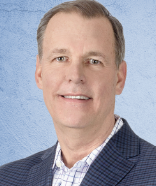 Mike Brown, Euronet Worldwide, Leawood
Mike Brown, Euronet Worldwide, Leawood
It’s tough to keep a low profile as a multibillion-dollar company, but the Leawood company Mike Brown co-founded in 1994 doesn’t make its living in Kansas—it mainly operates internationally as one of the world’s largest providers of electronic cash transfers, thanks to a global network of ATMs and other systems that keep the fires of capitalism burning. A Kansas City tech entrepreneur who has started, built, and sold multiple ventures, he hit on the Euronet concept several years after the fall of the Berlin Wall. That seismic shift in geopolitics sparked a realization: The introduction of Western-style economics would imply a need for Western-style access to cash for companies and individuals alike. Now, 30 years later, Euronet enables money transfers, ATM processing of credit and debit cards, point-of-sale services, branded payments, and currency exchange services, among others, in more than 200 countries and territories.
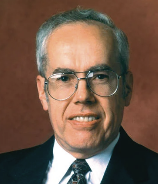 Gary Burrell, Garmin, Olathe
Gary Burrell, Garmin, Olathe
Not everyone fully understood the implications when Ronald Reagan opened the nation’s global positioning satellite network to civilian uses. Gary Burrell did. While the impetus for the change was to improve navigation and safety in commercial aviation, Burrell saw a more granular pathway: individual consumers. At that time, he was a senior exec for King Radio, and he teamed up with colleague Min Kao, and the rest is GPS-device history. After forming the new company in 1989, they set out to create directional technology for cars, trucks and private planes. Things clicked when Detroit made Garmin products available in vehicles. Today, publicly owned Garmin has more than 5,000 employees at its Olathe headquarters, more than 25,000 worldwide, and is among the planet’s biggest makers of GPS systems and wearable tech for fitness and outdoor recreational uses, with 2023 revenues of $5.23 billion.
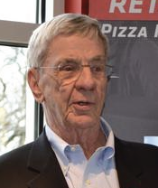
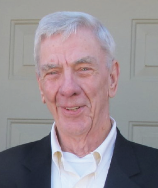 Frank and Dan Carney, Pizza Hut, Wichita
Frank and Dan Carney, Pizza Hut, Wichita
Frank and Dan. That’s it: You say those two names in Wichita, and people know precisely of whom you speak: The Carney brothers, legendary founders of Pizza Hut. They started with a single site in 1958, leavened with $600 borrowed from their mother, and laid the foundation for a global brand. After 20 years of slinging dough and building a monster franchising operation, they sold to PepsiCo. for a tidy $300 million (about $1.6 billion today). It’s impossible to over-state the impact these two had on Wichita: On their way up, they invited friends and family to the party. That created a group still known today as the Pizza Hut Millionaires, entrepreneurs who used their gains to start new ventures in consumer leasing, restaurants, hotels and even, in Dan’s case, other pizza ventures. Dan, now 93, survives Frank, who died in 2020 at age 86.
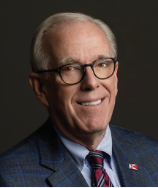 Charlie Chandler IV, INTRUST Bank, Wichita
Charlie Chandler IV, INTRUST Bank, Wichita
A lot of Chandlers have had their hands on the steering wheel for what is now INTRUST Bank, and that family history in Kansas banking runs back more than 140 years, to when an 18-year-old Charles Q. Chandler II purchased half-interest in a bank 112 miles west of Oklahoma City nearly 25 years before statehood. Seeking greener pastures, he made his way to Wichita, where the family tree’s roots have been set since 1900. Three generations later, Charles Q. IV wound down a career that started right out of college in 1976. In the nearly 50 years since, he’s overseen the rise of First National Bank of Wichita through a blend of organic growth, an acquisition, a rebrand in 1993 to become INTRUST, and expansion into the Manhattan, Topeka, and Kansas City markets. With nearly $7.1 billion in assets, it’s the third-largest bank in the state and No. 1 among banks based in the state’s largest city.
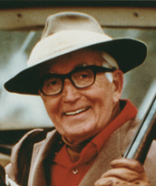 Sheldon Coleman Sr., Coleman Companies, Wichita
Sheldon Coleman Sr., Coleman Companies, Wichita
For nearly four decades, Sheldon Coleman Sr. served as chief executive of a brand that Wichita adopted as a measure of civic pride and commercial success: The Coleman Co. During his tenure, Coleman turned this one-time specialist in portable lanterns into a multi-faceted manufacturing concern that delivered various materials and parts to the hometown airline manufacturing, floor furnaces and air conditioners to the mobile-home sector, and—reflecting his own love of outdoor recreation—greatly expanded the company’s footprint with camping fans everywhere, introducing a wide range of coolers, camp stoves, backpacks and frames and even travel trailers. At its peak, the company employed thousands in Wichita. His death in 1988 touched off a series of misjudgments with efforts to take the company private, which allowed an outside investor to swoop in. The headquarters left town and employment fell, though Coleman still has a Wichita factory in production.
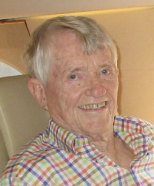 Jack DeBoer, Hotel Developer, Wichita
Jack DeBoer, Hotel Developer, Wichita
Yes, he was the father of the extended-stay hotel industry, but it would be unfair to label Jack DeBoer as simply the founder of Residence Inn: He also authored the Summerfield Suites, Candlewood Suites, Value Place and Waterwalk brands. His penchant for real estate showed up early; he made his first sale while still in high school in Kalamazoo, Mich. After earning a business degree from Michigan State, he started building homes in southern Michigan, working with his father, and pivoted to apartment construction, eventually putting up more than 16,000 across 25 states—at one point, National Real Estate Investor cited him as being the nation’s second-largest multi-family developer. He built the first Residence Inn in Wichita in 1977 and was a prominent fixture there as past president of the Chamber of Commerce, and co-founder of Wichita State’s Center for Entrepreneurship, among other roles.
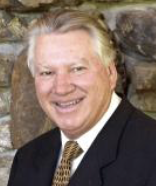 Tom Devlin, Rent-A-Center, Wichita
Tom Devlin, Rent-A-Center, Wichita
He’ll always be known as the founder of Rent-A-Center, which he took from startup in 1973 to the nation’s largest rent-to-own outlet for appliances and other durable goods. There’s much more to Tom Devlin’s entrepreneurship, though, thanks to having taken the company public in 1983 and selling it to a British company four years later for $594 million. Since then, he’s focused his Devlin Enterprises on investments in the energy and manufacturing, the hospitality and real estate sectors, among others. Perhaps his pride and joy is Flint Hills National Golf Club, which opened in 1997 in the Wichita suburb of Andover and was ranked by Golf Digest as the state’s second-best course, trailing only the legendary Prairie Dunes in Hutchinson. Devlin chronicled his business journey with a book, “Playing Through,” published in 2003, and he’s as an inductee into the Kansas Golf Hall of Fame.
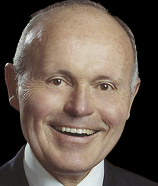
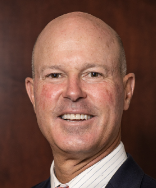 John C. and John B. Dicus, Capitol Federal Financial, Topeka
John C. and John B. Dicus, Capitol Federal Financial, Topeka
Even though it’s a public company, the family-business aspect has been part of Capitol Federal’s history for nearly a century. A big part of that was shouldered by John C. Dicus, who had worked part-time at the bank while studying at KU, came back in 1959 after a stint in the Navy, then became president a decade later. Over the course of 50 years, he had a hand in driving the savings bank’s adoption of new technology, adding branches across the state, and setting the stage to expand from a mortgage-lending focus to become the state’s biggest banking entity, with more than $9.5 billion in assets today. Signing on with CapFed was an easy call for young Dicus; his father-in-law, Henry Bubb, started there in 1926 and had been president since the onset of World War II. Since 2003, it’s been led by Jack’s son, John B. Dicus and the bank remains a powerhouse today.
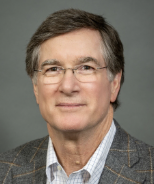 David Dillon, Dillon’s/Kroger, Hutchinson/Mission Hills
David Dillon, Dillon’s/Kroger, Hutchinson/Mission Hills
When Cincinnati-based Kroger came shopping in 1983, it picked up the best-known name among Kansas grocers: Dillons. The $750 million deal included more than brick-and-mortar stores in the family-owned chain based in Hutchinson, Kroger brought on board David Dillon, who would rise through the executive ranks to become CEO, then chairman, overseeing an era of strong growth. On his watch, revenue grew by $45 billion, the company expanded by adding 53,000 employees, and a series of focused cost reductions, share repurchases, and restored dividends steered $9.2 billion back to shareholders. After retiring in 2014, he came back closer to his roots, settling in Mission Hills and engaging with multiple corporate boards, including MRI Global, Union Pacific Railroad, and Hallmark. He has also served on the Board of Trustees for KU’s endowment association and The University of Kansas Hospital board.
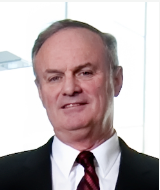 Terry Dunn, JE Dunn Construction/DD Ranch, Leawood
Terry Dunn, JE Dunn Construction/DD Ranch, Leawood
He spent 40 years turning the family-owned construction company into one of the nation’s largest contractors and a model of corporate citizenship in the Kansas City region. After retiring in 2014, though, Terry Dunn did not go gently into that good night. He leveraged a nearly unmatched record of corporate and civic engagement—a service history that includes 15 corporate boards and nearly three dozen non-profit boards and initiatives—to found DD Ranch in Leawood. Through it, Dunn recruits other retired executives who have much to offer as investors themselves or as directors and entrepreneurs in corporate, civic, and charitable initiatives. Neither did Dunn sever his cross-state-line ties with the Missouri-based JE Dunn Construction Co.; at the Ranch, he’s been a key figure in founding and supporting KC Common Good, a non-profit committed to helping the city combat a lingering challenge with violent crime and other social ills.
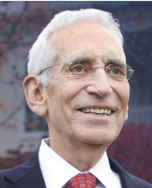 Jim Ferrell, Ferrellgas, Overland Park
Jim Ferrell, Ferrellgas, Overland Park
With a business degree in hand and military service behind him, Jim Ferrell could have charted a course anywhere. Fate intervened to bring him back to Atchison and his father’s struggling propane business. With that ship righted, Ferrell turned his attention to growth strategies, and in a business sector fraught with fragmentation, he saw an opportunity for scaling through acquisition. Throughout its history, Ferrellgas has executed more than 300 acquisitions, but one of the most important came with the $200 million deal for Buckeye Gas in 1984, a deal that pushed the company to No. 3 in the U.S. propane-services sector. He was quick to embrace the concept of employee ownership, implementing an ESOP plan in 1998, then pulled off a game-changer by merging with the Blue Rhino tank-exchange platform in 2004. Today, the company serves more than 1 million customers in all 50 states and had 2032 revenues of $1.84 billion, and Ferrell continues to serve as executive chair.
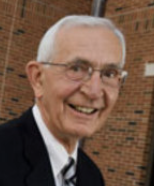 Howard Fricke, Security Benefit, Topeka
Howard Fricke, Security Benefit, Topeka
A pinnacle award in Howard Fricke’s professional trophy case came in 2000 when the Topeka Capital-Journal named him the Most Powerful Person in Topeka. There were good reasons for that: Billions, in fact. Under his leadership, revenues roughly quintupled for Security Benefit, the retirement services and wealth management company, peaking at $10 billion before his retirement as chairman in 2005. He was born near Springfield, Ill., started working for State Farm Insurance while attending Illinois Wesleyan, and after graduation, completed his MBA in advanced management at Harvard as he rose to executive roles with various insurers. He landed at Security Benefit in 1988, and on his watch, assets soared from $2 billion to more than $36 billion. He served on multiple local board roles, as United Way and Chamber of Commerce chairman, and after retirement, in two state cabinet posts—secretary of administration, then commerce.
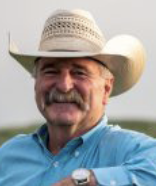 Mark Gardiner, U.S. Premium Beef/Rancher, Ashland
Mark Gardiner, U.S. Premium Beef/Rancher, Ashland
On the state level, Mark Gardiner stands out as a rancher—the Gardiner Angus Ranch sprawls across 48,000 acres of southwest Kansas. On a national level, he stands out for what happens to all that beef after it leaves the ranch. He was a founding board member of U.S. Premium Beef, which processes, distributes and markets beef. But not just any beef: The ranchers who pooled their might to create USBP were intent on raising and producing a higher grade of beef, something that would arrest the decline in consumption. Consumers who wanted a better steak were voting with their wallets, and Gardiner wanted them back. Mission accomplished: USPB’s annual revenues now approach $12 billion. He carries on a family tradition that dates to 1885 when the ranch was established. Nearly a century later, young Mark Gardiner left Kansas State University with a degree in animal sciences, headed back to the Ashland area, and helped build a nationally known brand.
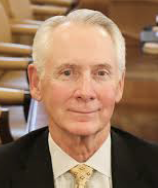 Bill Graves, Graves Truck Lines, Salina
Bill Graves, Graves Truck Lines, Salina
Bill Graves climbed on board at the family-owned trucking company after graduating from Kansas Wesleyan, but fate intervened to change his career arc—along with gubernatorial politics in Kansas. Encouraged by his father to get off the loading dock and into graduate school, Graves was soon surprised to find out while at KU that Dad was selling the company. That’s how he ended up on the campaign staff of George H.W. Bush in 1980, then landed in the Secretary of State’s office. The rest is political history: Graves won the department’s top elected job in 1986 at the age of 33, served two terms, then became governor, winning the 1994 election and again in 1998 with a staggering 73 percent, a record that still stands. Under his leadership, Kansas adopted a 10-year, $13 billion highway improvement plan that has been credited with improving the state’s business climate and stature within the nation’s logistics sector.
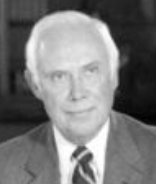 Jordan Haines, Bank IV/Fourth Financial, Wichita
Jordan Haines, Bank IV/Fourth Financial, Wichita
Presiding over the state’s largest bank, Jordan Haines had a reputation for getting things done. Case in point: Chairing the capital campaign for his alma mater, with a $120 million goal—and more than doubling it, hauling in $265 million. A KU grad himself—both undergrad and through its law school—this Sabetha native had career stops in Arizona and Texas before making his way closer to home with Fourth Financial Corp., where he eventually rose to CEO and chairman. Haines was known as a straight-shooter willing to weigh in on everything from banking and business to politics to KU sports to higher education policy, but he was eminently qualified to talk about the latter. He logged a term as chairman of the Kansas Board of Regents and was on the board of KU’s endowment association. He retired in 1991 and died in 2006 at age 78. Bank IV sold to Boatmens in 1995, then NationsBank before becoming part of Bank of America in 1998.
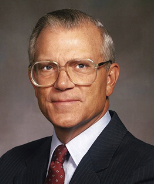 Don Hall Sr., Hallmark, Mission Hills
Don Hall Sr., Hallmark, Mission Hills
Before launching his career at the greeting card company his father had founded, young Don Hall got a taste of what was involved growing up in the family business. After Korea-era military service, he came back to work full-time when Hallmark was essentially a small greeting-card company. He spent five years learning every aspect of the business before becoming vice president, then followed his father into the CEO’s chair after nearly a decade. Over the next two decades, he directed Hallmark’s transformation to a global brand in greeting cards and a broader range of personal expressions, as well as manufacturing, entertainment, and real estate development. He and his late wife, Adele, were champions of philanthropy in Kansas City and beyond, supporting education, health care, the arts, human-services non-profits and other causes. Don Hall retired as chairman in 2016 and died this past October at the age of 96.
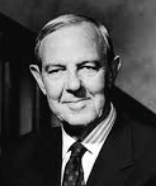 Paul Henson, Sprint Corp., Overland Park
Paul Henson, Sprint Corp., Overland Park
The company brand is gone; a key figure behind it will always be part of U.S. telecom-sector lore. From Sprint’s roots as a small, regional telephone company, Paul Henson forged the nation’s third-largest telecommunications company, compiling impressive growth metrics: United Utilities, as it was then known, operated in 500 rural communities with half a million customers and $42 million in revenues when he came on board in 1966. In 1990, when he resigned as chairman, Sprint was an $8 billion company serving 4 million customers nationwide, thanks in large part to his leadership in building the nation’s only all-digital fiber-optic network. He was raised on a farm in rural Nebraska, started at Lincoln Telephone & Telegraph while still in high school, earned bachelor’s and master’s degrees in electrical engineering at NU, and began his trek through the ranks at United in 1959. He died in April 1997.
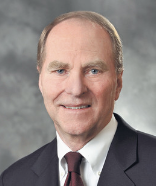 Hank Herrmann, Waddell & Reed, Overland Park
Hank Herrmann, Waddell & Reed, Overland Park
Hank Herrmann poured 45 years of his life into building a national financial services and wealth-management colossus at Waddell & Reed by the time he retired in 2016. Five years later, the brand was gone, absorbed into an Australian conglomerate called Macquarie Group. But the leadership that made W&R one of the region’s biggest public companies (revenues peaked at more than $1.6 billion under Herrmann) and one of its biggest wealth-management firms was definitely old-school. In the early 1980s—well before he was even CEO—Institutional Investor magazine did a cover piece on the firm titled “Piranha Tank.” “I was flattered by that,” Herrmann would later tell a documentary crew. Herrmann was also a champion of civic and corporate engagement in the Kansas City area, including stints on the boards for the United Way of Greater Kansas City and Blue Cross and Blue Shield of Kansas City.
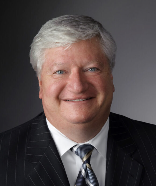 Cliff Illig, Cerner, OnGoal, Leawood
Cliff Illig, Cerner, OnGoal, Leawood
The Kansas City area has been fundamentally changed by what Cliff Illig brought to executive leadership. One of three founders of Cerner Corp.—the health-care informatics company absorbed by Oracle Corp. in 2021—Illig has flexed his influence with ownership interests in Sporting Kansas City, as an investor in other startups, and as a change agent to give the region reasons to call itself The Soccer Capital of America. Cerner made him a billionaire, and he has used that financial muscle with Sporting to help promote youth soccer across the metro region over the nearly 20 years since his ownership group acquired it from Lamar Hunt. The growing regional interest in soccer eventually fueled the creation of the Kansas City Current, Sporting’s female counterpart, and a successful civic push to earn host city status in the FIFA World Cup in 2026. A KU School of Business graduate, he’s also past president of the Boy Scouts Heart of America.
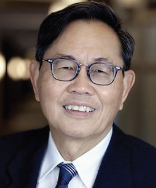 Min Kao, Garmin, Olathe
Min Kao, Garmin, Olathe
Min Kao left the comparative security of a job with AlliedSignal when he teamed up with colleague, Gary Burrell, to pursue an idea: The federal government had granted civilian use of the global-position satellite system. Kao had a key role in development of the first GPS navigator certified by the FAA—couldn’t that also be the platform for a geolocating system in cars? Thus was born Garmin Industries, which he and Burrell built into a global producer of navigation systems used in cars, boats and planes. They started with a small office that had a pair of folding chairs; today, Garmin is a global power with $5 billion in annual revenue and 35,000 employees. Kao retired as CEO in 2012, but still serves as executive chairman (Burrell died in 2019). His training began with a bachelor’s in electrical engineering from National Taiwan University, and from there, he headed to the University of Tennessee for his master’s and Ph.D. in that field.
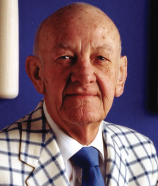 Ewing Kauffman, Marion Labs/KC Royals, Mission Hills
Ewing Kauffman, Marion Labs/KC Royals, Mission Hills
Kansas City helped make Ewing Kauffman a wealthy man. More than 30 years after his death, his instinct to give something back to the community was still being felt. He was, after all, the figure most responsible for the creation of the Kansas City Royals, who treated fans to a long-overdue playoff appearance in 2024. Mr. K’s road to success started with $5,000 he scraped together to start a small pharmaceutical company in his basement. That was in 1950. Nearly 30 years later, his controlling interest in his Marion Labs eventually fetched more than $5.2 billion from Dow Chemical, generating the resources Kauffman needed to fund an expansion team after the loss of the Kansas City A’s to California. That sale made millionaires of roughly 300 Marion Labs employees, many of whom used their proceeds to launch life-sciences startups of their own. Kauffman was 76 when he died in 1993.
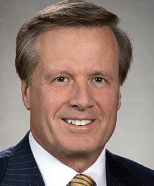 Mike Kiley, Security Benefit, Topeka
Mike Kiley, Security Benefit, Topeka
The financial crisis of 2008 was not kind to Security Benefit, the Topeka retirement-services company. In the lean years that followed, it lost assets and employees, as well. Then, it summoned Mike Kiley to leadership, first with the transition team after the 2010 acquisition by Guggenheim Partners of New York and then as CEO in 2011. In that role, he put Security on the offensive, bringing new products to the market and expanding the firm’s distribution footprint. At a firm that posted an operating loss in 2009, he oversaw a rebound that produced more than $1 billion in net income by 2021. Assets under management quintupled on his watch, soaring past $50 billion in what industry insiders call one of the sector’s biggest turnarounds in a century. When he retired in 2022, he left behind a work force of 2,000 and a thriving enterprise with a spinoff now branded as Zinnia, which serves other wealth-management firms.
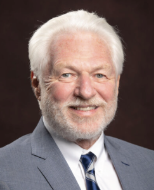 Jim Klausman, Midwest Health, Topeka
Jim Klausman, Midwest Health, Topeka
Not long after leaving Washburn University with a degree in political science, Jim Klausman found his calling: Senior living. In 1977 he teamed up with friend, Butch Eaton, to lease a single nursing home. Today, Midwest Health encompasses 90 senior-living centers across Kansas, Nebraska, Oklahoma, Missouri, Iowa, and Illinois. Klausman understood that “senior living” wasn’t just one thing; it’s a spectrum of independent living, assisted living, and skilled nursing possibilities. A native of Valley Falls, KS, whose parents and grandparents gave him the foundation in senior living, he moved into new territories: Breath Oxygen and Medical Supply, Caregivers Home Health, and SeniorRx Care Pharmacy, all complementing the primary business. Then came the leap into property development, golf course ownership, restaurants and manufacturing.
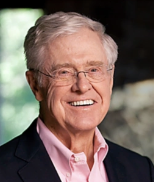 Charles Koch, Koch, Wichita
Charles Koch, Koch, Wichita
There simply is no business executive in Kansas with a track record of success like that carved out by Charles Koch. At 89, he still carries the title of co-CEO for the nation’s second-largest private company, with extensive holdings in energy-related companies, agribusiness and consumer products, and more recently, electronics manufacturing and software—and revenues estimated at more than $125 billion a year. Koch himself has been at the helm for the remarkable growth and expansion since 1967, after the death of his father, founder Fred Koch. He’s a champion of free-market principles broadly, creative destruction as a business philosophy, and pushing a culture of innovation across a global work force of more than 60,000. His wife, Elizabeth, has also been powerful voice for business ownership with her founding of Youth Entrepreneurs, a non-profit focused mainly on high-school students.
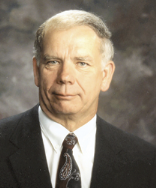 Don Landoll, Landoll Corp., Maryville
Don Landoll, Landoll Corp., Maryville
It started 60 years ago with a welding shop, but Don Landoll saw the potential for something bigger. From that humble start, Landoll Corp. has mushroomed into a global supplier of trailers, farm equipment, material-handling components and other machines that make America work, with a special focus on the farm and transportation sectors. What sets his success apart is that Maryville has only about 3,400 residents—making the company’s work force nearly one-fourth of the town’s population. It’s a jobs magnet attracting workers from across north-central Kansas into Nebraska, turning out flatbed and enclosed trailers, construction equipment, a broad range of tillage, plowing and seeding applications for farmers, among others. A native of Hanover in neighboring Washington County, Landoll learned the fundamentals of mechanical engineering on the farm, where if something was broken, you figured out a way to fix it or risked losing a harvest day going to town.
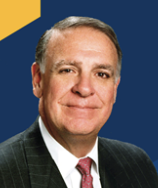 Jack Lockton, Lockton Companies, Mission Hills
Jack Lockton, Lockton Companies, Mission Hills
You’ll find a separate Kansas City on the maps of Kansas and Missouri, but much of the pinnacle business success of the latter is owed to people who made their homes in the former. As with Jack Lockton, who created the world’s largest privately held, independent insurance brokerage after starting with a single office and an answering machine back in 1966. For a solid decade, he labored to secure clients, first by focusing on the construction sector. In 1976, he brought aboard his brother David (who would succeed him as CEO), expanded the service line to cover the manufacturing and real estate sectors, created a benefits consultancy, and then added retirement planning services. In 2006, Lockton Companies was big enough to acquire a London firm and establish a toehold overseas. Today, the company has more than 12,500 employees, clients in more than 140 countries. He died at 61 in 2004.
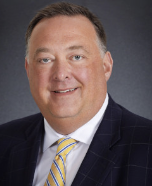 Mike Maddox, CrossFirst Bank, Leawood
Mike Maddox, CrossFirst Bank, Leawood
In one of the nation’s most competitive banking markets—the Kansas City region—the epicenter of that combat is Johnson County. And that’s where Mike Maddox laid down a marker in 2007 with the founding of CrossFirst Bank. As CEO, he orchestrated the biggest startup-to-kingpin performance in modern Kansas banking history. As of this year, CrossFirst had amassed $7.6 billion in assets, making it the state’s second-largest bank and surpassing many that have been operating for more than a century—including the one where he’d previously served as regional president. An Oklahoma native, he left the University of Kansas with degrees in business and law, along with something else few possess: an NCAA national championship ring from the 1988 basketball season. The pinnacle of his banking career came this past August, with word that CrossFirst would merge with Busey Bank in an all-stock deal valued at $916.8 million.
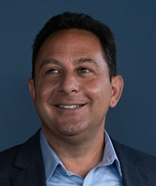 Peter Mallouk, Creative Planning, Overland Park
Peter Mallouk, Creative Planning, Overland Park
The youngest member of a group that shaped 50 years of business in Kansas isn’t much older than that—54-year-old Peter Mallouk, the mastermind behind the assembly of the state’s largest wealth-management firm. What Mallouk has done since acquiring a boutique firm in 2004 isn’t merely a matter of scale, going from $100 million in assets under management to more than $300 billion. It’s a matter of quality: Creative Planning is now an annual fixture near the top—or at the top—of Barron’s magazine’s rankings of the nation’s leading wealth managers. It got there by upping the value proposition on wealth management, taking it from a narrow focus on portfolio management to encompass a broad range of adjacent financial challenges for investors—tax strategies, insurance and legal needs, business success, shaping philanthropic goals and more. Mallouk holds multiple degrees from KU—business, MBA and law.
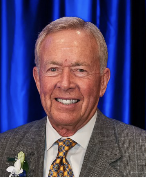 Russ Meyer, Cessna Aircraft, Wichita
Russ Meyer, Cessna Aircraft, Wichita
Russ Meyer was practicing at a Cleveland law firm when a client company that was making light aircraft invited him to join the leadership team. Once on board, his aviation network expanded to include Cessna’s Dwayne Wallace. That was the link that brough Meyer to the Air Capital in 1974, and over the course of 30 years, he led a transformation from propellor-driven planes to focus solely on jet aircraft. In a wildly cyclical industry—Cessna had 13,000 employees in 1983 and 3,000 in 1988—he steered it through the 1992 acquisition by Textron, retired in 2004 and has remained as chairman emeritus for 20 years. A graduate of Yale and Harvard Law School, Meyer developed his love for aviation while serving as a fighter pilot in the Air Force and Marine Corps. Meyer, who has more than 19,000 hours as a pilot, was inducted into the Kansas Aviation Hall of Fame in 1996 and the National Aviation Hall of Fame in 2009.
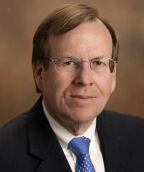 David Murfin, Murfin Drilling, Wichita
David Murfin, Murfin Drilling, Wichita
I.W. Murfin founded an oil drilling company in Wichita nearly a century ago, and his grandson, David, is the exception that proves the rule about third-generation family ownership of companies. As president of what is now Murfin, Inc., he leads one of the state’s biggest oil producers, not just pulling it out of the ground but exploring new drilling opportunities in the Midwest and Rocky Mountain regions. Last year, the Kansas Geological Survey says, the company produced 982,000 barrels of oil. The parent Murfin, Inc. also includes Murphy Tractor and Equipment Co., operating 28 sites across six states as one of the largest John Deere construction dealers in North America. Outside the company, he has served on the Kansas Board of Regents, setting policy for the state-funded universities, and built a civic resume of board service with the Greater Wichita Economic Development Coalition, the Wichita Chamber of Commerce and others.
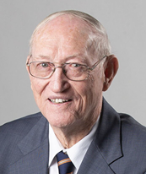 Cecil O’Brate, American Warrior, Garden City
Cecil O’Brate, American Warrior, Garden City
The vast, largely empty expanse of southwest Kansas is a good place for most people to keep a low profile, but Cecil O’Brate wasn’t “most people.” Far from it: He was an entrepreneur who leveraged farming, oil and gas production, and a shrewd sense of investing while establishing American Warrior as one of the premier names in oil and gas production companies in Kansas. A child of the Great Depression, he once said that experience was a prime motivator to succeed in business: “I knew what it was to be poor and I just knew that I didn’t want to be poor,” O’Brate once told an interviewer. He made his way to Oklahoma State University, and after dabbling in architecture, he pivoted to structural engineering. Loyalty to his alma mater inspired him to donate $35 million to build the baseball stadium that opened in 2021 and bears his name. He died this past January at the age of 95.
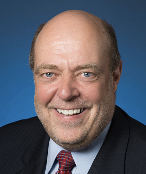 Bob Page, The University of Kansas Health System, Kansas City
Bob Page, The University of Kansas Health System, Kansas City
Can the CEO of a public health authority be an entrepreneur? If that’s not how you’d define Bob Page, we’re going to need another definition. An entrepreneur is willing to risk everything, and Page wasn’t far from that when he left a comfortable executive role with BJC Health in St. Louis to sign on at The University of Kansas Hospital in 1996. Not until he took the job did he become aware of the challenge: It had just a month’s worth of operating cash on hand, if that. But in spearheading the break with Kansas to assert the organization’s financial independence, Page helped set the stage for a new mission, model and culture, one focused on much better outcomes and much higher patient satisfaction. Since he arrived, and became CEO in 2007, the hospital has gone from middle of the pack Top 10 in the market to No. 1, based on annual admissions and 2023 revenues of $15.5 billion.
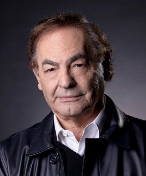 Phil Ruffin, Ruffin Properties, Wichita
Phil Ruffin, Ruffin Properties, Wichita
Search Google images for Phil Ruffin, and like as not, you’ll see a photo of him with one of his business associates and close friends. A fellow named Donald. As in Trump. As in our next president. That’s the rarefied business atmosphere Ruffin occupies as owner of the Treasure Island Hotel & Casino plus half of the Trump International Las Vegas hotel. What a long journey it’s been since days of flipping burgers to save up for what would be his entrepreneurial breakthrough when he bought his first self-service gas station near Wichita. Sixty gas stations and a couple of other ventures later, he had enough capital to enter the hotel sector and built the Wichita Marriott in 1987. Leasing out the convenience stores allowed him to buy the Crystal Palace resort in the Bahamas, and when he sold it, the $70 million in proceeds led to the latest phase of his career underway with casino ownership. Forbes estimates his net worth today at $2 billion.
 Bill Simon, Freddy’s Frozen Yogurt, Wichita
Bill Simon, Freddy’s Frozen Yogurt, Wichita
Cancer claimed Bill Simon all too soon at the age of 61 in 2016, but he didn’t go out without having set the stage for one of the biggest entrepreneurial success stories in recent Kansas history: Freddy’s Frozen Custard & Steakburgers. Introduced to entrepreneurship by his father—the namesake of today’s restaurant chain—young Bill learned how to make money mowing yards, doing basic gardening and making landscaping figures. After securing an accounting degree from K-State, he worked in corporate accounting roles, including Rent-A-Center franchising. In 2002, he and his brother Randy partnered with Freddy, for whom the chain was named, and Scott Redler to introduce a new restaurant concept in a hugely competitive arena. From that single store, Freddy’s today has locations operating in 37 states under Randy’s leadership, and the company is ranked in the top 10 for growth in the restaurant industry.
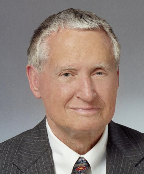 Don Slawson, Slawson Companies, Wichita
Don Slawson, Slawson Companies, Wichita
Slawson Hall on the KU campus? For that, you can thank Don Slawson’s penchant for risk-taking as a businessman. Ditto the Slawson Family Tiger Trek at the Sedgwick County Zoo. The trendy shopping districts in Wichita? He was behind those, too. The founder of Slawson Companies started his oil-and-gas exploration firm in his hometown of Wichita back in 1957, turned it into one of the state’s premier producers, and then leveraged that success into real estate, where he also had a hand in more than two dozen residential developments to complement his nose for commercial projects. An early plan to work for his father in the insurance business was sidetracked at KU when he shifted from political science after taking a few geology courses. He was twice appointed to the Kansas Board of Regents, including a term as chairman, and led a number of Wichita civic and philanthropic initiatives. He was 80 when he died in 2014.
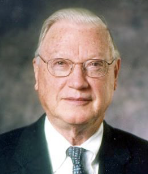 James Sunderland, Ash Grove Cement, Overland Park
James Sunderland, Ash Grove Cement, Overland Park
In a 43-year career that started as corporate secretary for the family-owned business, James Sunderland moved up the ranks to president and chairman, building Ash Grove Cement into one of the nation’s biggest producers of Portland cement, a key ingredient in construction. His legacy as a third-generation leader was to mold one of the Kansas City region’s biggest private companies. He certainly had the blood line to do that: Sunderland’s grandfather, Lester, first joined the company in 1909, eventually acquired it, then turned the reins over to his own son, and James’ father, Paul. James earned a business degree from Washington and Lee University in Virginia, then went to law school at Washington University in St. Louis. At Ash Grove, he also was a one-man civic whirlwind, serving on corporate boards as well as non-profit boards, and he was one of the co-founders of the Greater Kansas City Community Foundation.
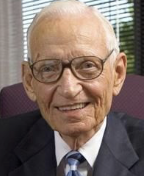 Cecil Van Tuyl, VT Enterprises, Kansas City
Cecil Van Tuyl, VT Enterprises, Kansas City
At one point, Cecil Van Tuyl had the apex company among the biggest private companies in the Kansas City area. He did that by building a national network of vehicle dealerships despite having only one in his hometown market, Van Chevrolet. But his influence was well known, with tributes pouring in from executives at General Motors following the 85-year-old Van Tuyl’s death in 2012. After starting with a single dealership in Kansas City, he built the nation’s largest network of private dealerships. His business legacy, though, easily transcends the vehicle showroom. In 2010, he and his son Larry created VanTrust Real Estate, a full-service real estate development company, and the Van Tuyl business legacy includes VT Land Group, specializing in single- and multi-family development; Vantage Investment Partners, investing in public equity and credit markets; and VT Private Capital.
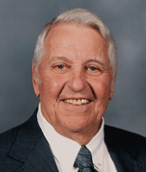 Jack Vanier, C.K. Ranch, Brookville
Jack Vanier, C.K. Ranch, Brookville
There are ranches, and then there is C.K. Ranch, the sprawling family enterprise that covers roughly 15,000 acres of pastureland, with another 1,000 in tillable crop ground southwest of Salina in the heart of Kansas. Jack Vanier was the longtime overseer of the ranch, which started with the first 5,300 acres purchased by his father, J.J. Vanier. At one point, he was overseeing the nation’s largest producer of purebred Hereford cattle, just one piece of a ranching empire that reached into Colorado, Oklahoma and Wyoming. He was a titan of the industry, holding leadership roles at the national and state levels with the American Hereford Association and the Kansas Livestock Association. He also served on the boards of Archer Daniels Midland and the National Cattlemen’s Association. Before his death at age 94 in 2023, his family presented K-State with a gift of $60 million—the largest private donation in the university’s history.
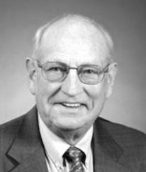 Sterling Varner, Koch, Wichita
Sterling Varner, Koch, Wichita
The death of Fred Koch in 1967 put his son, Charles, in the driver’s seat at Koch Industries. Riding shotgun with him for much of the next 20 years as it became one of the nation’s biggest private companies was Sterling Varner, who served as president from 1974 to 1987. A Texas native raised in Oklahoma, he always had a close relationship with the land and an enormous respect for it as a natural resource. He entered the Koch sphere when Fred bought the Oklahoma refinery where Varner was working. Over the next six decades, he served as a purchasing agent, crude oil trader, and ranch manager. After retiring as vice chairman of the Koch board in 1989, he bought the 16,000-acre Shadow Valley Ranch in the Flint Hills, and he assisted Liz Koch, Charles’s wife, with the development of Youth Entrepreneurs of Kansas, to help introduce high-school students to the concept. He was 89 when he died in September 2009.
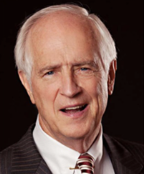 Nestor Weigand, Weigand Real Estate, Wichita
Nestor Weigand, Weigand Real Estate, Wichita
Every large city usually has one prominent surname that stands as a brand of its own in real estate. In Wichita, that brand is Weigand, thanks in large part to the lifelong labors of Nestor Weigand. Raised in Wichita, he earned a degree in finance from Notre Dame, then came back to River City with the J.P. Weigand & Sons, the family real estate business. It was 1961, when his net worth, he would later say, consisted of “$625 and a 1951 Packard.” That would change quickly, and in 1983, he became the firm’s president and CEO. Over the next four decades, he built the firm into Wichita’s largest and shared his passion for promoting the American Dream by serving a term as president of the Kansas Association of Realtors and, later, the National Association of Realtors. His influence was such that President Ronald Reagan invited Weigand to offer guidance on strengthening fair housing laws in the U.S. He died at 84 in November 2023.